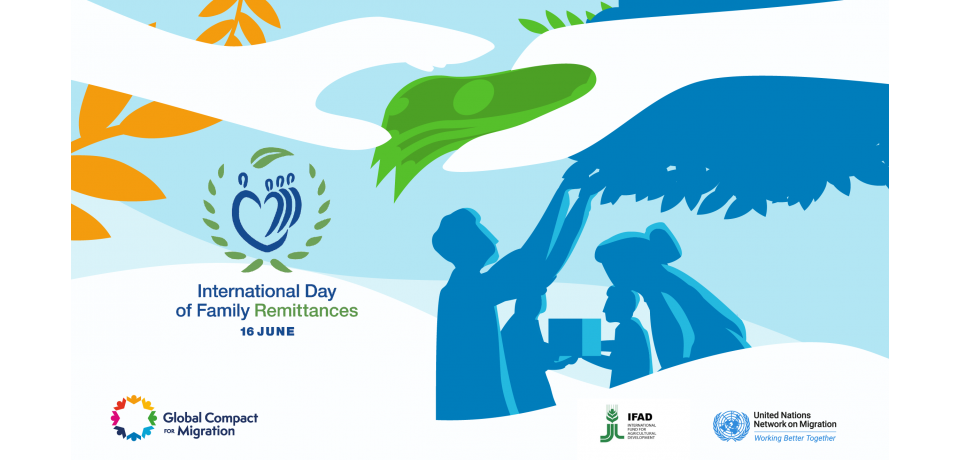Joint Message by the UN Network on Migration on the occasion of the International Day of Family Remittances
Objectifs de Développement Durable Connexes et Objectifs du Pacte Mondial sur les Migrations
DATE: 16 JUN 2021
Read the statement here.
On the occasion of the International Day of Family Remittances (IDFR), the United Nations Network on Migration recognizes the crucial contribution that migrant workers and their families make, especially through their remittances, to the social and economic development of their communities and countries of origin.
Beyond the financial contribution of remittances as private transfers, migrant women and men also significantly contribute to their home and host countries’ economies and societies by filling gaps in the labour market, creating jobs as entrepreneurs, promoting trade and foreign direct investment, adding to the tax base, transferring skills as well as sharing knowledge, cultures and values across boundaries.
The Network calls on the international community to realize Objective 20 of the Global Compact for Safe, Orderly and Regular Migration (GCM), which encourages the global community to find ways to “promote faster, safer and cheaper transfer of remittances and foster financial inclusion of migrants.”
Remittances are a vital source of income for millions across the world, making an immense difference to 800 million family members by improving access to health services and nutrition, education, housing and water and sanitation as well as promoting their financial inclusion. Due to the steady inflow of remittances, millions of families have been lifted out of poverty, making the achievement of Sustainable Development Goals (SDGs) a reality for countless persons.
Yet, these benefits often come at great sacrifice. In too many places, the human and labour rights of migrant workers are violated. Moreover, children and families of migrant workers suffer from the long-term absence of one or both parents.
As a result of the COVID-19 pandemic, migrants have been affected by job losses, reduced wages and limited access to unemployment benefits. Migrants have strived to send as much money as possible, often using their savings to support family members back home, while also struggling with the loss of income and pandemic-induced economic slowdown. It remains critical that migrants and their families enjoy decent work and have access to transnational social protection schemes.
“Remittances are a lifeline in the developing world – especially now,” said United Nations Secretary-General, António Guterres. Where remittances slowed or stopped, we witnessed an increased inclination for children to drop out of school, families cutting back on meals and children facing increased risks of child marriage and child labour and other forms of exploitation.
The steady remittance flow in 2020 in some regions of the world is partly due to the greater use of digital remittance channels and a broad shift in flows from informal to formal channels. According to the World Bank, in 2020, officially recorded remittance flows to low- and middle-income countries reached U$540 billion, only 1.6 per cent below the $548 billion recorded in 2019. They are projected to increase again by 2.3 per cent this year, to $553 billion.
In the first quarter of 2020, the global average cost of transmitting remittances was still at 6.4 per cent, that is, more than twice the target of 3 per cent set by the SDGs. Sub-Saharan Africa remains the most expensive region to send money to, with an average of 8 per cent.
Lack of transparency about the costs of transferring remittances, limited competition, and difficulties in accessing formal financial services, especially in rural areas, constitute some of the major reasons why the cost of sending remittances remains excessive in many corridors. It is crucial that governments create a regulatory environment that reduces the costs of transferring remittances, allows competitive channels for transferring remittances and increases their productive use.
Digital and financial literacy of migrant workers and remittance recipients is essential to foster informed choices on the use of remittances and remittance-linked services, and to leverage these flows for development purposes. The Network reiterates the call to the current financial ecosystem to encourage migrants and their families to send, receive and use remittances in gender-responsive ways that promote their financial inclusion and allow them to invest in productive sectors of the economy.
Today, the Network, bringing together 39 United Nations entities, joins the IDFR 2021 campaign “Recovery and resilience through digital and financial inclusion” and reaffirms its commitment to advocate to promote faster, safer and cheaper remittance transfers, foster financial inclusion of migrants and their families back home, and protect migrant workers’ human and labour rights.
For more information, please contact:
IFAD
Mauro Martini
m.martini@ifad.org +39 06 5459 2813
UN Network on Migration (secretariat)
Florence Kim
fkim@iom.int +41797480395
